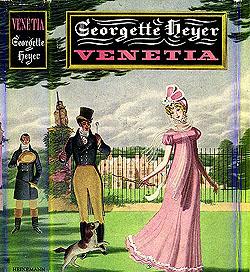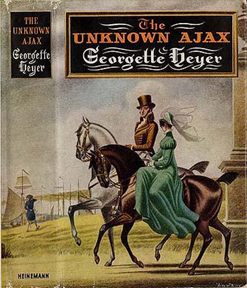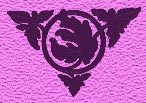![]()
Miss Charing, had she been present, would undoubtedly have been able to have supplied Olivia with the context of these mock-heroics; Olivia by far less well-read, was cast into adorable confusion (Heyer, Cotillion 219).
Within the world of Georgette Heyer's Cotillion, Jack Westruther's comment remains elliptical although Miss Charing would have been able to explain the reference to Shakespeare's Twelfth Night and certainly so would Heyer herself, the unwitting and perhaps unwilling founder of the Regency romance. However, Heyer wears her erudition lightly and does not stop in the novel to explain the reference. The purpose of the comment, indeed, has less to do with Shakespeare or with Twelfth Night, than with the limited education of one heroine and the rather greater knowledge of the other.
Heyer uses Shakespeare frequently and rarely if ever notes the source of the quotations that she offers. In Black Sheep, Miles Calverleigh declares his intentions to Abigail Wendower with an entirely appropriate, if gender-reversed, comment that Helena offers in All's Well that Ends Well: "'I was always a poor hand at making flowery speeches.' He smiled at her again a little ruefully. 'That I should love a bright particular star'" (Heyer 161). Miles, the black sheep in question, is well aware that he is to all appearances an inappropriate suitor; even when Abby objects to the comment, she does not appear to recognize its source. More directly--and subversively--in Sprig Muslin, Heyer invokes Romeo and Juliet's balcony scene in order to underscore how far from the star-crossed lovers is the situation between the wilfull Amanda and her would-be rescuer: "Perched on a stable-ladder, a modern Romeo and Juliet discussed ways and means. It did not take long for them to disgard the trappings of convention. 'Oh, I wish you will not call me Miss Smith!' said Juliet. 'Amanda!' breathed Mr. Ross reverently. 'And my name is Hildebrand'" (Sprig Muslin 134). As quickly as the pair abandons convention, Heyer moves on from the Shakespearean allusion, designed to puncture rather than support romantic illusions.
This kind of deflationary move is perhaps dates from very early in Heyer's work. In her 1944 novel, Friday's Child, the child-like Hero reveals the Shakespearean antecedents of her name. Fresh from the school-room, Hero then cheerfully tells her feckless new husband of convenience, Antony, Lord Sherington, that his name, too comes from Shakespeare. She even floors Sherry's decidedly unbookish friend, Ferdy, by kindly including his name in the roster:
"You're out of Shakespeare too," said Hero, helping herself
liberally from a dish of green peas.
"I am?" Ferdy exclaimed, much struck.
"Yes, in the Tempest, I think"
"Well, if that don't beat all!" Ferdy said, looking
around at his friends (56).
This array of information about their names raises the horrible
possibility in Ferdy's mind that Hero may be a bluestocking, a
comment which draws a vigorous defense from both her new husband and
his other friend. However, even greater than his anxiety that his
hostess might be bookish is the prospect of what her comments might
mean about the night's entertainment: "A fresh bogey at once
raised its head, and he demanded in accents of extreme foreboding,
whether the evening's entertainment was to consist of Shakespeare.
Upon being reassured, he was able to relax again and to continus
eating his dinner in tolerable composure" (57). Shakespeare
safely disposed of, the novel then turns to other matters, though the
loss of Hero later in the book does provoke her youthfull husband
finally to value his bride--fulfilling the Friar's prediction in the
novel in ways that it does not come true in Much Ado. 
More extensive and acknowledged uses of Shakespeare appear in Heyer's Venetia and The Unknown Ajax. In Venetia, the lovers-to-be quote Shakespeare to each other in their first meeting, when he steals a kiss from a girl he takes to be a mere local and comments, "And Beauty's self she is" (27). His quotation's context offends proprieties, but so does Venetia's response that he is "a most pestilent complete knave" (28). Her quotation comes from Othello where Iago is maligning Cassio to Roderigo; the end of his sentence in the play reads, "and the woman hath found him already" (Oth. 2.1. 246-7). Since Iago is insisting that Desdemona has been intimate with Cassio, Venetia's embarrassment is understandable, though Heyer does not explain it: "Venetia, who had suddenly remembered the rest of the quotation, replied, 'If you don't know, I certainly shan't tell. That phrase is apt enough, but the context won't do'" (28). Heyer does, however, give a few clues since Damerel comments that he had better study his Shakespeare and by the end of the page has offered his own more-recognizable quotation from Othello: "My reputation, Iago, my reputation!" (28). Since he even gives one of Cassio's lines, it seems clear that both characters know the context for Venetia's earlier comment. Even though there is no guarantee that the reader will get the joke, the bantering of the characters shows clearly that they understand each other and that Shakespeare is a language they share. By the end of their first encounter, Venetia has moved to deflate his flowery compliments by quoting Olivia's dismissive list of her beauties in Twelfth Night, completing a couplet of "Cherry-Ripe" and remembering an appropriate quotation from Byron. Shakespeare is not the only literary context that this unusual pair share, but he recurs throughout the novel. When Venetia finally proposes to the rakish hero at the end of the novel, she takes the cue of wooing from Viola's willow cabin speech in Twelfth Night: "I warn you, love, that if you cast me out I shall build a willow cabin at your gates--and very likely die of an inflammation of the lungs, for November is not the month for building willow cabins!" (Heyer 288). She handily picks up on the quoting back and forth which they have been doing throughout the novel and prosaically combines the romance of building the willow cabin with its unrealistic aspect in late autumn (or indeed in January if the twelfth night in question can be taken as the epiphany).

The numerous references to Troilus and Cressida in The Unknown Ajax arise not within the romantic plot but from the hostility towards the new "heir" in the Darracott family. Vincent Darracott, whose line to the title has been supplanted by a cousin he didn't know about, speaks most of these lines. Hugh Darracott, the unwished for heir, is unacceptable to both his grandfather and cousin because his father married and sired him with the weaver's daughter. This complicated background to Vincent's hostility explains both his assumptions about Hugh--that he is an oversized oaf from the merchant class--and the form his hostility takes--taunting references to Hugh as the intellectually challenged yet heroically proportioned Ajax in Troilus and Cressida. Vincent's Shakespearean barbs are aimed to insult Hugh on two levels, by suggesting that he is as dimwitted as Ajax and by flaunting the superior education that Vincent has presumably received as a result of class position.
In Heyer's novels, however, matters are never just so straightforward. Not only is Hugh not as volatile or as vain as Ajax from the play, but also he is far from dimwitted, though he is content to play the Yorkshire dullard for almost all his newly rediscovered family. The heroine, his cousin and love interest Anthea Darracott, sees through his adopted persona early on; in fact, she finally corners him about his education--at Harrow rather than Eton, but nonetheless public school of stature. Moveover, instead of proving the fool and using his brawn to resolve the major plot crisis, Hugh so cleverly deceives the excise man who is trying to arrest Anthea's younger brother that Anthea's final accolade completely inverts the "Ajax" slurs which Vincent has been levelling throughout the novel. She finally accepts his suit and praises him, "Noble Ajax, you are as strong, as valiant, as wise, no less noble, much more gentle, and altogether more tractable!" (2.3.150-52). Although Agamemnon is merely co-operating with Ulysses's plot to use Ajax in order to get Achilles involved in the fight, Anthea is using the lines truthfully and accurately to describe Hugh, whose tractibility above all has made him look to be easily manipulated and oafish to his prejudiced male relatives.
Go to Introduction References by Play Return to Rewriting Shakespeare
